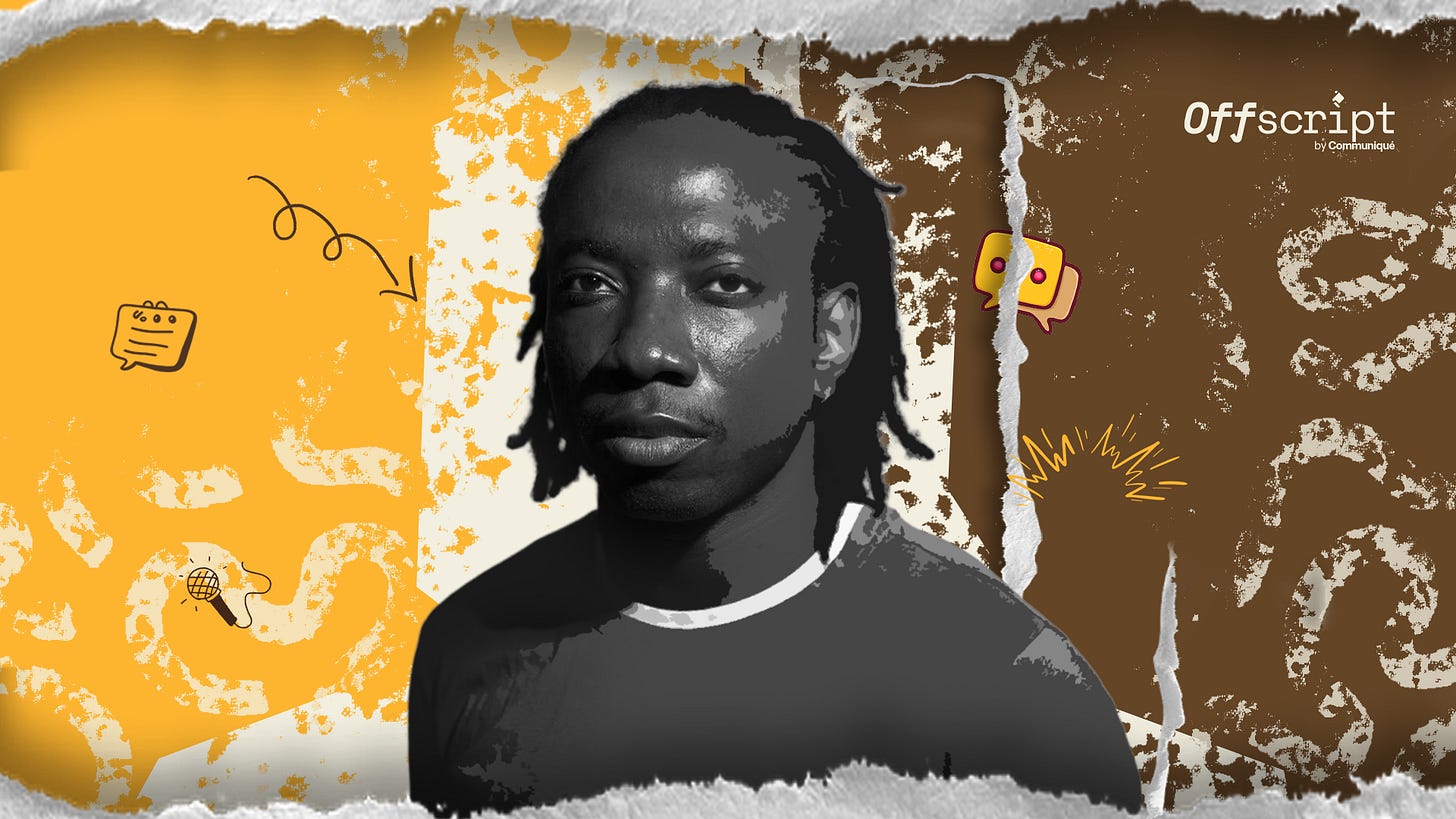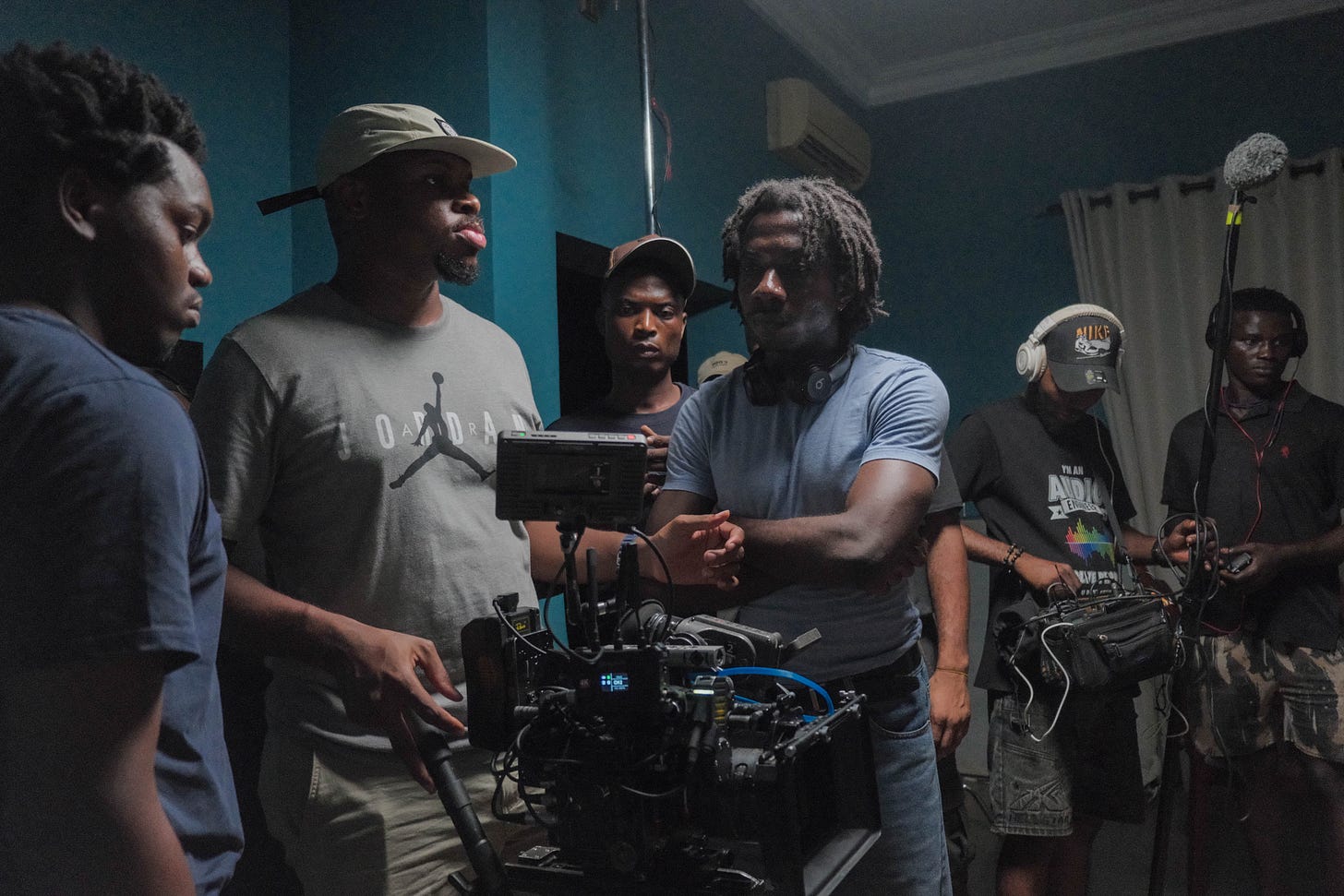How Dika Ofoma found his voice in Nigeria’s indie film movement
The 25-year-old filmmaker on his journey building a career outside of Lagos, Nigeria’s commercial capital, one indie short film at a time
“It hasn’t been that long since I started doing this, so it’s too early to look back,” he says with a small laugh. “I know that I had fun making the first short films, and I’m still having fun making the short films I’m making now.”
For someone who insists it’s “too early to look back,” Dika Ofoma has already built a body of work that demands attention. At just 25, he’s one of the most promising new voices in Nigeria’s burgeoning independent cinema movement. A self-taught filmmaker whose shorts have earned critical praise and festival recognition while redefining what Nigerian stories can look and feel like outside Lagos.
His latest project, Something Sweet (a Zikoko feature), was praised as “a breath of fresh air” for its intimate and unconventional take on love. Before that came A Japa Tale (2023), The Way Things Happen (2022), and God’s Wife (2025), which earned him the Rising Star Award at the S16 International Film Festival. Each film feels distinct, yet all are tied together by the same thing that defines Ofoma himself: an instinctive curiosity about people and the quiet moments that reveal them.
Ofoma grew up in Gombe, northern Nigeria, in a middle-class neighbourhood that mixed cultures and languages. “We lived in Sabongari, then later in Yelenguruza,” he recalls. “It wasn’t completely Igbo-dominated, but there were enough of us around that it felt familiar.”
His home was a place of stories, both written and spoken. His father kept a small library, and long before Dika could read, he was listening to retellings of Macbeth and Julius Caesar. “I think I knew the stories of Shakespeare before I could read,” he says. “My dad would tell them to me like bedtime stories.”
When he did start reading, he devoured everything: Macmillan novels, Pacesetter series, Achebe’s Chike and the River, and The African Child by Camara Laye. Television opened another world entirely. “We had cable TV early, so I watched everything—Hollywood, Bollywood, Nollywood. Then I would gather my cousins and friends, and we’d reenact what we saw.”
That blend of books, films, and imagination became the foundation of his storytelling. By junior secondary school, he was writing plays for graduation ceremonies. “Everyone else was performing the same plays year after year,” he remembers. “I wanted something different. So I’d write a new one and direct it myself.”
It wasn’t a path his teachers expected. He excelled in math and sciences, even representing his school in the Cowbell Mathematics competitions. Choosing the arts track in senior secondary school caused a minor crisis. “There was an actual staff meeting about it,” he recalls. “In Nigeria, when you’re smart, people assume you’ll study science and become a doctor. But I’ve always been sure of what I wanted.”
University followed, though not exactly as planned. He had wanted to study Law, but when his chosen university lost its Council of Legal Education accreditation, he ended up at Imo State University studying History and International Studies instead. He wasn’t particularly bothered. “I knew I was going to school just to get a degree,” he says. “If I could’ve studied what I truly loved, it would’ve been Theatre Arts, but nobody was going to pay my fees if I put that on my JAMB form.”
Ofoma knew where he was going, but he still had not figured out how to get there. In the meantime, he continued writing short stories, reading film scripts online, and watching more and more films. The films Tango with Me and Ijé made him realise that Nigerian storytelling could be more deliberate, more emotional, and more cinematic.
Clarity arrived in 2020, during his National Youth Service in Enugu. At the time, Ofoma was freelancing as a pop culture writer for local and international publications, but that December, he resolved to start learning filmmaking.
“I downloaded Celtx, bought The Foundations of Screenwriting by Syd Field, Story by Robert McKee, and started studying YouTube tutorials, especially the StudioBinder channel. Their videos broke down directing and cinematography really well.”
Then came the conversation that changed everything. “I was walking back from a hike with a friend, we’d been talking about Phantom Thread by Paul Thomas Anderson, and he asked, ‘You talk about film a lot. What’s the end goal?’ I said I wanted to be a filmmaker. Then he asked, ‘So what are you doing about it?’” That question stuck. Within weeks, he wrote a script and shot it on his friend’s phone. “We uploaded it to YouTube. Some people liked it. When I posted it on Instagram and Twitter, it got attention.” That short film was Soma, his unofficial debut.
Around that time, filmmakers he admired began to take notice of his work. Among them was Jade Osiberu, award-winning producer and founder of Greoh Studios, who invited him to Lagos to collaborate on a project. It was his first professional screenwriting job.
In that same year, he reunited with his friend to make another short film, The Way Things Happen (2022). This film gave Ofoma a first taste of widespread fame. “The response blew my mind,” he says. Acclaimed director CJ Obasi reached out to him, encouraging him to take the festival route in distributing his films. That advice changed his outlook. His next short, A Japa Tale, premiered at Obasi’s S16 Film Festival and later went viral on YouTube. By 2023, Dika had established himself as a thoughtful chronicler of everyday life, using small, contained stories to explore big emotions.
“I don’t see short films as practice for features,” he says. “They’re complete on their own. I’m drawn to slice-of-life cinema, picking a moment from someone’s life and saying something true about it in ten or fifteen minutes.”
Unlike many of his peers, Ofoma built his career in Enugu, far from the noise of Lagos. “People think you have to move to Lagos to make it,” he says. “But I’ve made every one of my short films here, except Something Sweet. I love this city. It gives me peace and perspective.”
That love now fuels his first documentary, a commission exploring Enugu’s creative and tech communities. “It’s my love letter to Enugu,” he says. “My career started here, and I want to show that great stories can come from anywhere.”
Ofoma’s filmmaking remains a deeply collaborative and personal process. His early films were self-funded; shot with borrowed cameras, edited on a laptop, made with the help of friends. “We raised money from our circles,” he says. “Sometimes ₦100,000, sometimes more. Nobody expected returns; they just believed in the work.”
Today, his budgets have grown into the millions. He works with professional crews and actors, but insists the approach hasn’t changed. “I still make films to learn, to experiment, to connect,” he says. “I just have better tools now.”
When asked what success looks like, his answer is immediate. “The goal has always been to build a community of people who are interested in my films,” he says. “That’s why I put my work on YouTube. I’m not chasing awards. It would be nice to have them, but it’s not what keeps me up at night. What keeps me up is getting people genuinely interested in my work.”
Five years from now, he hopes to still be making the kind of films that make him happy. “It’s easy to lose focus,” he says quietly. “To start thinking about what the industry wants or what’s trending. I want to keep telling the stories that matter to me. I hope I’m a better filmmaker by then, but more importantly, that I hope I haven’t lost the reason I started.”






He’s one of my favorite filmmakers